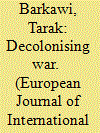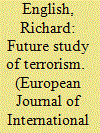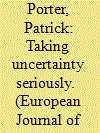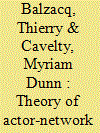|
|
|
Sort Order |
|
|
|
Items / Page
|
|
|
|
|
|
|
| Srl | Item |
| 1 |
ID:
145673


|
|
|
|
|
| Summary/Abstract |
What would it mean to decolonise the concept of war? ‘Decolonising’ means critiquing the ways in which Eurocentric ideas and historiographies have informed the basic categories of social and political thought. Dominant understandings of the concept of war derive from histories and sociologies of nation-state formation in the West. Accordingly, I critique this Eurocentric concept of war from the perspective of Small War in the colonies, that is, from the perspective of different histories and geographies of war and society than were assumed to exist in the West. I do so in order to outline a postcolonial concept of war and to identify some of the principles of inquiry that would inform a postcolonial war studies. These include conceiving force as an ordinary dimension of politics; situating force and war in transnational context, amid international hierarchies; and attending to the co-constitutive character of war and society relations in world politics.
|
|
|
|
|
|
|
|
|
|
|
|
|
|
|
|
| 2 |
ID:
145670


|
|
|
|
|
| Summary/Abstract |
This article reflects on the central problems to be faced over the next fifty years of the academic study of terrorism. It discusses a series of problems that are sometimes raised (regarding definition, the division between Critical Terrorism Studies and Orthodox Terrorism Studies, and the supposed stagnation in contemporary terrorism research), and argues that these present rather limited difficulties, in reality. It then identifies a greater problem, in the form of a five-fold fragmentation of the current field, before offering suggested means of addressing in practice these latter, more profound difficulties.
|
|
|
|
|
|
|
|
|
|
|
|
|
|
|
|
| 3 |
ID:
145674


|
|
|
|
|
| Summary/Abstract |
According to rationalists and constructivists, compliance with international law occurs to the extent that states see non-compliance as unreasonable or wrong, respectively. An alternative account of compliance points to the practical difficulty of deciding to act contrary to international law. Here non-compliance is blocked rather than morally or instrumentally deterred. This article advances an organisational-process theory of this third kind. The explanatory mechanism lies in the constitutive rules of foreign policymaking, and points to the institutional function of legal advising. Under certain structural conditions (namely, lawyerised decision-making) legal advisers operate as the principal ‘agents of compliance’ within the state, bringing international law into the policymaking process and thus bridging the gap between foreign policy and legal expectations. The theory is applied to the interrogation programme implemented by the United States in the early years of the ‘War on Terror’ (2001–5). While initially violative of international legal standards, the programme eventually shifted towards compliance. Using process tracing, the case study provides fine-grained evidence that corroborates the explanatory power of organisational factors, in general, and legal advising, in particular.
|
|
|
|
|
|
|
|
|
|
|
|
|
|
|
|
| 4 |
ID:
145675


|
|
|
|
|
| Summary/Abstract |
If we can’t reliably predict the future, how can we be wise when preparing for it? Examining the UK’s ‘Strategic Defence and Security Review’ of 2010, I demonstrate that though planners often rightly invoke uncertainty, they also imply a highly certain ideology about Western power and foresight. Modern ‘national security states’ describe the world as dangerously uncertain, yet fall prey to a misplaced confidence in their ability to anticipate and prevent threats. I argue that classical realism, especially that of Clausewitz and Morgenthau, is a valuable resource for handling uncertainty more reflexively. Classical realism counsels that governments should go beyond attempts to improve foresight. They should try to check against the fallibility of their assumptions, marshal their power more conservatively, insure against the likelihood of predictive failure by developing the intellectual capability to react to the unknown, and avoid misplaced confidence in their ability to bring order into chaos.
|
|
|
|
|
|
|
|
|
|
|
|
|
|
|
|
| 5 |
ID:
145672


|
|
|
|
|
| Summary/Abstract |
This article argues that some core tenets of Actor-Network Theory (ANT) can serve as heuristics for a better understanding of what the stakes of cyber-security are, how it operates, and how it fails. Despite the centrality of cyber-incidents in the cyber-security discourse, researchers have yet to understand their link to, and affects on politics. We close this gap by combining ANT insights with an empirical examination of a prominent cyber-incident (Stuxnet). We demonstrate that the disruptive practices of cyber-security caused by malicious software (malware), lie in their ability to actively perform three kinds of space (regions, networks, and fluids), each activating different types of political interventions. The article posits that the fluidity of malware challenges the consistency of networks and the sovereign boundaries set by regions, and paradoxically, leads to a forceful re-enactment of them. In this respect, the conceptualisation of fluidity as an overarching threat accounts for multiple policy responses and practices in cyber-security as well as attempts to (re-)establish territoriality and borders in the virtual realm. While this article concentrates on cyber-security, its underlying ambition is to indicate concretely how scholars can profitably engage ANT’s concepts and methodologies.
|
|
|
|
|
|
|
|
|
|
|
|
|
|
|
|
| 6 |
ID:
145671


|
|
|
|
|
| Summary/Abstract |
While US counterterrorism has improved in many respects since the attacks of 11 September 2001, there have still been turf battles and many cases of inadequate coordination between security agencies, which have had damaging effects on intelligence work and operations against terrorist groups. Why, more than 14 years after 9/11, do US inter-agency operations still break down in this manner? By comparing the United States with the United Kingdom, this article provides a new explanation for the deficiencies in the American response. It shows how US inter-agency conflict has negative operational consequences and draws a contrast with the British security agencies, which tend to be more closely integrated and refrain from engaging in major turf battles. I argue that the differences between the cases stem from a combination of distinct institutions and different organisational routines in the US and UK. In the United States, divided national institutions and the informal routines of its security agencies have proved problematic for joint operations and intelligence work. The article also critiques some influential existing accounts of US inter-agency counterterrorism, which emphasise bureaucratic politics or organisational culture, and shows how such perspectives can produce unrealistic policy recommendations. A focus on the deep-seated routines and institutions of the United States leads one to be more sceptical about the prospects for meaningful organisational reform.
|
|
|
|
|
|
|
|
|
|
|
|
|
|
|
|
|
|
|
|
|